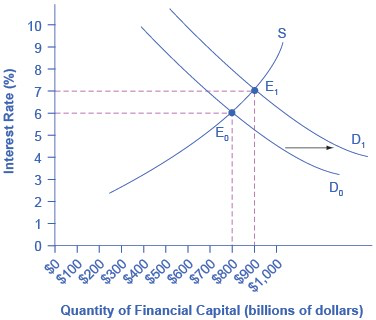Fiscal Policy Affects Interest Rates
How Does Fiscal Policy Affect Interest Rates?
- Marketing, Advertising, Sales & PR
- Accounting, Taxation, and Reporting
- Professionalism & Career Development
-
Law, Transactions, & Risk Management
Government, Legal System, Administrative Law, & Constitutional Law Legal Disputes - Civil & Criminal Law Agency Law HR, Employment, Labor, & Discrimination Business Entities, Corporate Governance & Ownership Business Transactions, Antitrust, & Securities Law Real Estate, Personal, & Intellectual Property Commercial Law: Contract, Payments, Security Interests, & Bankruptcy Consumer Protection Insurance & Risk Management Immigration Law Environmental Protection Law Inheritance, Estates, and Trusts
- Business Management & Operations
- Economics, Finance, & Analytics
How Does Fiscal Policy Affect Interest Rates?
Because fiscal policy affects the quantity that the government borrows in financial capital markets, it not only affects aggregate demand—it can also affect interest rates. In the chart below, the original equilibrium (E0) in the financial capital market occurs at a quantity of $800 billion and an interest rate of 6%. However, an increase in government budget deficits shifts the demand for financial capital from D0 to D1. The new equilibrium (E1) occurs at a quantity of $900 billion and an interest rate of 7%.
A consensus estimate based on a number of studies is that an increase in budget deficits (or a fall in budget surplus) by 1% of GDP will cause an increase of 0.5–1.0% in the long-term interest rate.

When a government borrows money in the financial capital market, it causes a shift in the demand for financial capital from D0 to D1. As the equilibrium moves from E0 to E1, the equilibrium interest rate rises from 6% to 7% in this example. In this way, an expansionary fiscal policy intended to shift aggregate demand to the right can also lead to a higher interest rate, which has the effect of shifting aggregate demand back to the left.
Related Topics
- What is Government Spending?
- Autonomous Spending
- Autonomous Consumption
- Fiscal Policy
- Expansionary Fiscal Policy
- Contractionary Fiscal Policy
- Progressive vs Regressive Tax
- Marginal Tax Rates
- Proportional Tax
- Trickle Down Theory
- Discretionary Fiscal Policy
- Automatic Stabilizers
- Effects of Discretionary Policy (Interest Rates & Lags)
- Crowding Out Effect
- National Debt
- Government Borrowing
- Golden Rule
- Ricardian Equivalence
- Balanced Budget - Deficit and Surplus
- National Debt
- Standardized Employment Budget
- Deficit Hawk
- Austerity
- Twin Deficits
- Fiscal Policy and the Aggregate Supply and Demand Curve
- Stabilization Policy
- Robin Hood Effect
- Ricardo Barro Effect
- Automatic Stabilizers
- Standardized Employment Budget
- How Does Fiscal Policy Affect Interest Rates?
- Crowding Out
- Types of Lag in Fiscal Policy
- Temporary and Permanent Fiscal Policy
- Limitations of Fiscal Policy?
- How Politics Affects Discretionary Fiscal Policy
- Government Borrowing
- National Savings and Investment Identity
- Debtor Nation
- Fiscal Policy Affects Trade Balances
- Twin Deficits
- Exchange Rates Affect Budget and Trade Deficits
- What are the risks of chronic large deficits in the United States?
- How Fiscal Policy Can Affect Trade Imbalances
- Government Borrowing Affect Private Savings
- Ricardian Equivalence
- Fiscal Policy Affects Investment and Economic Growth
- Crowding Out of Physical Capital Investment?
- How Does Government Borrowing Affect Interest Rates in Financial Markets?
- Government Investment in Physical Capital
- Public Investment in Human Capital
- Fiscal Policy Can Affect Technology Development
- Economic Cycle or Business Cycle
- Business Cycle Indicator
- Peak and Trough
- Recession and Depression
- Hard Landing vs Soft Landing
- Economic Bubble
- Boom and Bust Cycle
- Great Depression
- Baby Boomer Age Wave Theory
- Skyscrapper Effect (Economics)
- V-Shaped Recovery
- W-Shaped Recovery
- U-Shaped Recovery
- Kondratieff Wave Cycle
- Contagion
- Feedback Rule Policy
- American Customer Satisfaction Index
- CNN Effect
- Bureau of Economic Analysis
- Business Starts Index
- American Recover and Reinvestment Act
- Abenomics
- Emergency Economic Stabilization Act of 2008
- Commodity Credit Corporation
- Humphrey Hawkins Act